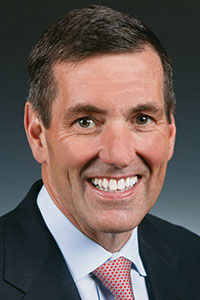
LOUISVILLE, Ky. (BUSINESS WIRE) — Humana Inc. Thursday unveiled its “2020 Bold Goal Progress Report,” which details the company’s progress in its ambitious population health strategy launched in 2015 to improve the health of the communities it serves by 20 percent by 2020.
The progress report, which can be accessed here, details the ongoing efforts to help address the impact that social determinants of health and health-related social needs, such as food insecurity and loneliness, have on the physical and mental health of the Medicare Advantage population.
While the report focuses on Humana’s continued Bold Goal efforts in 2019, Humana President and CEO Bruce Broussard said the recent public health crisis of COVID-19, and the spotlight on systemic racial inequities, shows more than ever the need for personalized care for each of Humana’s members.
“During the last five years working in the Bold Goal communities, we have seen firsthand the impact of clinical and social needs on our members,” Broussard said. “COVID-19 has further widened ongoing health disparities, disproportionately affecting Black and Latino communities. Humana is deeply committed to working with our community and government partners to ensure we support members in improving their mental and physical health. Working together, we can break down barriers to drive lasting change.”
As part of its efforts to address these issues, Humana held a virtual event, in conjunction with the National Press Club, this week entitled “No Better Time: Rethinking routine in a post-COVID-19 world and how we are addressing the impact of racism and racial inequity in health care.” The event consisted of a series of virtual panels that covered these issues and others that relate to the Bold Goal.
Humana’s Bold Goal is focused on addressing the needs of the whole person by co-creating solutions to address social determinants and the health-related social needs for our members and communities, including helping members access to healthy food, connect socially and address housing needs. Humana is continuing to expand the Bold Goal into new communities. The company has grown from its original seven Bold Goal communities in 2015 to 16 designated Bold Goal communities.
Humana uses the U.S. Centers for Disease Control and Prevention (CDC) Healthy Days assessment tool to measure the mentally and physically unhealthy days of individuals over a 30-day period, covering Humana member populations through lines of business such as Medicare Advantage, Group and Medicaid.
Listed below are some key findings from the 2020 Bold Goal Progress Report:
- For the first time since Humana began benchmarking, Humana Medicare Advantage members across all markets improved their Healthy Days. These members experienced 816,000 more Healthy Days than they would have otherwise experienced had the company and its partners not collaborated on projects to target and improve health outcomes.
- Many Humana Medicare Advantage members in our original Bold Goal communities have fewer Unhealthy Days. Medicare Advantage members who reside in Tampa had 3.7 percent fewer Unhealthy Days, and members who reside in New Orleans had 2.2 percent fewer Unhealthy Days since 2015.
- Humana screened more than 2.6 million Humana members for social determinants of health in 2019. Solid partnerships with physician practices, community organizations and other business partners enabled Humana to screen our members for social needs. Humana found that each member screened had an average of 3.5 health-related social needs (e.g. food insecurity, socially isolated or lonely), and it is why the company employs a personalized approach to the care of each member.
- Helping Medicare Advantage members living with multiple chronic conditions is leading to more Healthy Days. Members with chronic obstructive pulmonary disease (COPD), coronary artery disease, depression, and congestive heart failure are experiencing an increase in Healthy Days compared to the year prior.
It is clear that the health-related social needs support that economically disadvantaged members are receiving is helping to maintain and even improve their health. Embedded in this progress in a nearly four percent improvement in Healthy Days among low-income members. Humana Chief Medical Officer William Shrank, MD, MSHS, who leads the Office of Health Affairs and Advocacy, argues that helping these members will also require empowering providers with the means to access social risk data in electronic health records.
“While the movement toward interoperability is gaining momentum, physicians need a detailed understanding of their patients, and that comes when they have data that identifies unhealthy behaviors,” Dr. Shrank said. “Humana’s holistic approach to addressing whole-person health, combined with our strong provider partnerships, enabled us to reduce the number of Unhealthy Days for Medicare Advantage members living with chronic conditions, and this is an essential part of Human Care.”
A key element of Humana’s Bold Goal holistic health approach has been to enhance community partner relationships. Caraline Coats, Vice President, Bold Goal and Population Health Strategy, who leads the company’s efforts, believes that the partnerships Humana has formed with community organizations are fundamental to building a healthcare delivery system that can meet the social needs of its members as they adjust to the aftermath of the pandemic.
“We were able to successfully adapt and craft quick solutions to address the clinical and social needs of our most vulnerable members,” Coats said. “We are at a time when our work has not mattered more. What we do, who we serve and how we can make a difference are all top of mind every day.”
Humana will continue to measure our progress through the end of the year and report on our original aspirational Bold Goal next year. For more information, please visit https://populationhealth.humana.com/.




















Add Comment